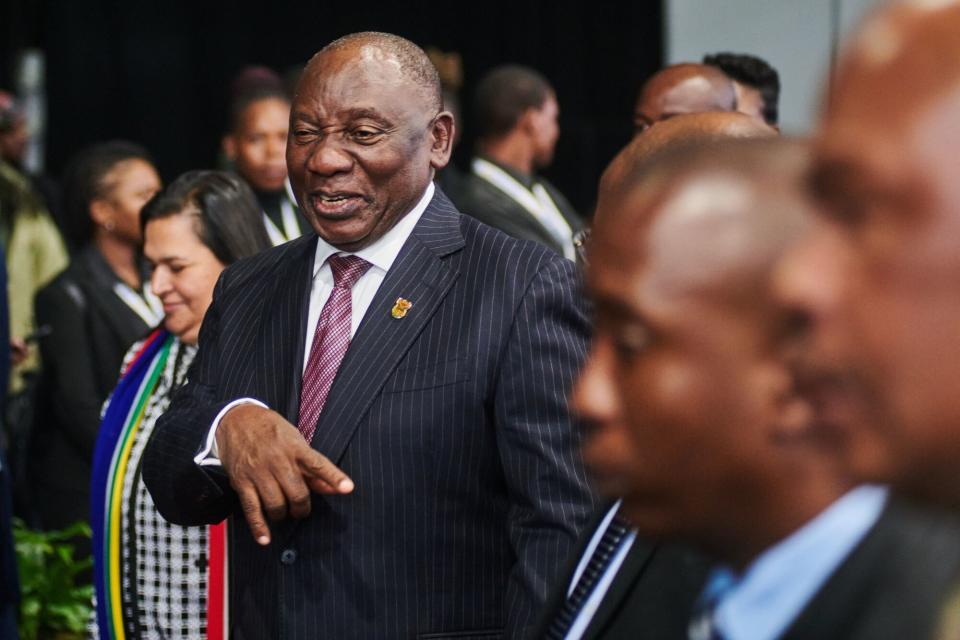South Africa’s ANC Weighs Unity Government, Spooking Markets
(Bloomberg) -- South Africa’s African National Congress favors forming a government of national unity that would include a range of political parties after last month’s elections failed to produce an outright winner, an option it may struggle to convince its main rivals to accept.
Most Read from Bloomberg
Billionaire-Friendly Modi Humbled by Indians Who Make $4 a Day
A Struggling Business Park Deals a Blow to Singapore's Regional Hub Ambitions
S&P 500 Hits 25th Record This Year as Tech Soars: Markets Wrap
‘Everything Is Not Going to Be OK’ in Private Equity, Apollo’s Co-President Says
The rand weakened on concerns the new administration will include populist groups and have to accommodate a wide range of views, giving rise to policy uncertainty.
ANC officials have held exploratory talks with delegations from a number of opposition parties as well as allies including the Congress of South African Trade Unions and the South African Communist Party about working together, ANC spokeswoman Mahlengi Bhengu-Motsiri told reporters in Johannesburg on Wednesday.
“The best option” at this point is “looking at the government of national unity, because this is what the people of South Africa said to us — put together a multi-party arrangement that works for the benefit of South Africa,” she said after a meeting of the ANC’s national working committee, which oversees the day—to-day running of the party. Any decisions will have to be taken by its larger national executive committee, which meets on Thursday.
The ANC won marginally more than 40% of the vote in the May 29 elections, losing its parliamentary majority for the first time and meaning it will have to rely on its main rivals to retain power. They are the business-friendly Democratic Alliance, the leftist Economic Freedom Fighters and possibly former President Jacob Zuma’s uMkhonto weSizwe Party, or MKP.
The ANC faces an uphill battle in getting its rivals to work together. The Democratic Alliance leader John Steenhuisen on Tuesday ruled out working with either the EFF or MKP, which both favor nationalizing mines and banks, while Zuma’s party has said it will only work with the ANC if President Cyril Ramaphosa is replaced — a condition the ANC has said is unacceptable.
“The question remains whether the opposition will accept a broad coalition,” said Melanie Verwoerd, an independent analyst and former ANC lawmaker. “It’s going to be really tricky to negotiate a deal and ensure that it holds.”
The rand fell as much as 1.3% on Wednesday, and traded 1% weaker at 18.8658 per dollar by 2:59 p.m. in Johannesburg.
Investors have fretted about the entry of the EFF and Zuma’s party into any future coalition because it may disrupt economic reforms introduced under Ramaphosa’s administration and undermine property rights.
“I think a government of national unity would likely result in policy paralysis and a stalled reform agenda, and possibly even a government that does not include Ramaphosa as president,” said Brendan McKenna, emerging markets economist and FX strategist at Wells Fargo Securities LLC. “Also, incorporating EFF and possibly MKP ideologies into policy would likely result in fiscal slippage and a broader worsening of public finances, as well as less policy predictability over the longer term.”
Sign up here for the twice-weekly Next Africa newsletter.
Attempts to reach out to Zuma’s MKP failed to illicit a positive response, according to Bhengu-Motsiri.
“The ANC is keen and determined to engage all parties and unite the broadest range of sectors of our population behind the urgent need to move our country out of the current potential electoral stalemate,” she said. “Our door remains open as we continue to reach out to every party that is keen to contribute positively to moving our country forward.”
Nelson Mandela led a government of national unity after South Africa’s first democratic elections in 1994 that included the National Party, which ruled the country during apartheid. It lasted until 1997, when the NP walked out.
You can follow Bloomberg’s reporting on Africa on WhatsApp. Sign up here.
--With assistance from Ana Monteiro and Colleen Goko.
(Updates with analyst comment from seventh paragraph.)
Most Read from Bloomberg Businessweek
David Sacks Tried the 2024 Alternatives. Now He’s All-In on Trump
Startup Brings New Hope to the Pursuit of Reviving Frozen Bodies
The Budget Geeks Who Helped Solve an American Economic Puzzle
©2024 Bloomberg L.P.




